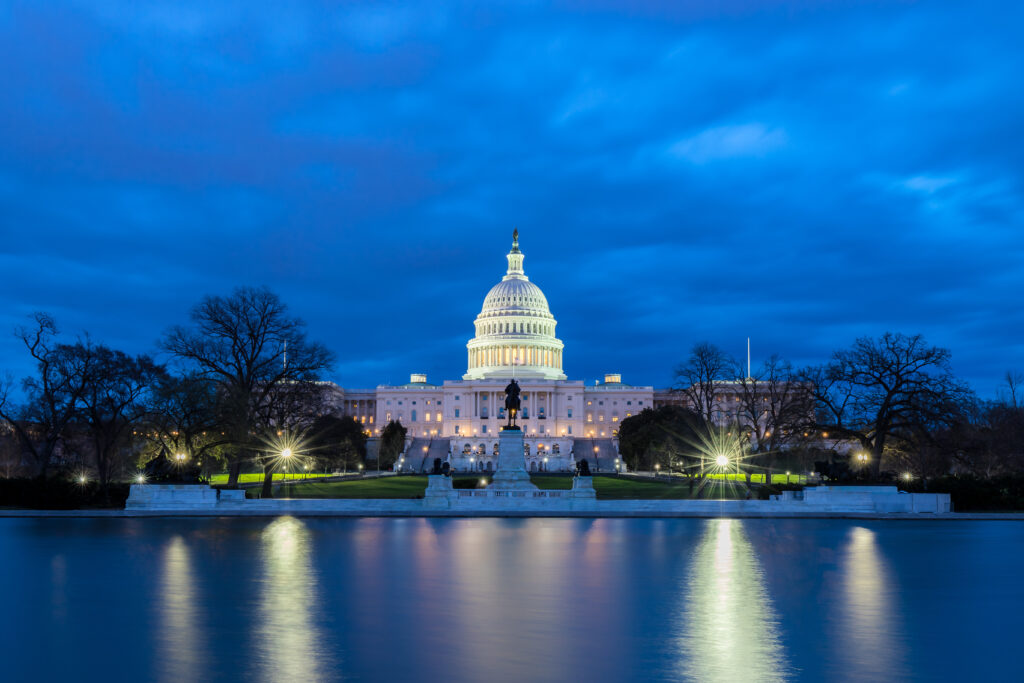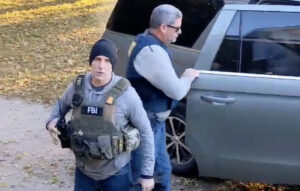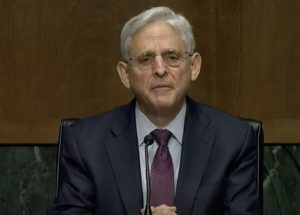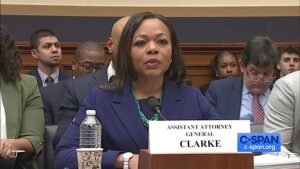4 takeaways from weaponization hearing on FBI
(The Daily Signal) – The Justice Department’s top watchdog and a successful FBI whistleblower took questions Wednesday from a House panel investigating the weaponization of government.
Key…

(The Daily Signal) – The Justice Department’s top watchdog and a successful FBI whistleblower took questions Wednesday from a House panel investigating the weaponization of government.
Key witnesses testified before the House Judiciary Select Subcommittee on Weaponization of the Federal Government, noting how such weaponization applies to larger problems within the FBI.
The Justice Department’s Office of Inspector General said in a May memo that the FBI failed to comply with whistleblower protections in suspending the security clearance of a bureau employee, Marcus Allen.
Allen, a former FBI staff operations specialist, raised questions about the official narrative regarding whether the bureau had confidential informants on the scene of the Capitol riot on Jan. 6, 2021. Allen also testified before the House’s government weaponization subcommittee in May 2023.
Inspector General Michael Horowitz told the House panel that his office is investigating the role of FBI informants at the Capital riot, but may not issue a report until after the next president is sworn in Jan. 20
The FBI suspended Allen’s security clearance in early 2022 and restored it this past June. At that point, he dropped his complaint to Horowitz’s Office of Inspector General.
Here are four takeaways from the hearing Wednesday.
1. ‘Battle for Truth and Justice Will Cost You’
Allen testified that he wasn’t able to work during his unpaid leave and had to dig into retirement savings.
“The battle for truth and justice will cost you, but the arduous good is worth it,” Allen said. “No [previous] FBI whistleblower has ever had his clearance restored as I did.”
He said he has never regretted his decision to be a whistleblower and is “grateful for the experience.”
“My family and I persevered due to our strengthened faith, God’s grace, and the sacraments,” Allen said.
Allen said he learned that Jeffrey Veltri, now the FBI’s special agent in charge in Miami, ridiculed Allen’s Christian faith as one of his supervisors.
Veltri recently made news for leading the FBI’s investigation in Florida into the second assassination attempt on Trump.
As Allen spoke, his voice cracked and he became visibly emotional.
“If you do not worship God, then you will worship something else. You can serve God or you can serve mammon, but you can’t serve both,” the former FBI employee testified, paraphrasing Scripture. “This has been a purification. When we lost material items, we gained important things. We have stored up for ourselves treasures in heaven. What we have gained spiritually far outweighs what we have lost materially.”
Allen cited two early presidents, John Adams and James Madison, during his testimony.
“This isn’t about me. It’s bigger,” he said. “I am hopeful that the truth of what happened will be fully revealed and deter the FBI from doing the same injustice to others.”
Empower Oversight President Tristan Leavitt, who heads the whistleblower advocacy group that represented Allen, called for legislative reforms to protect whistleblowers.
“The FBI smeared him with the lie that he was a threat to our national security,” Leavitt said of Allen. “That lie was repeated here in this hearing room. One year later, the FBI reinstated his security clearance and agreed to restore 27 months of back pay. This amounts to an official admission by the FBI that claims about his disloyalty to the U.S. were false.”
Leavitt said what happened to Allen is not an isolated case.
“This summer, we disclosed that the security division forced FBI employees to rat out their coworkers if they had ever heard them ‘vocalize support for President Trump’ or ‘vocalize opposition to the COVID-19 vaccination,’” Leavitt testified. “We now understand that was just one manifestation of the FBI’s politicized climate.”
Michael Horowitz, the Justice Department’s inspector general, testified that the FBI’s conduct “creates a risk that the security process can be misused as part of an inappropriate effort to encourage an employee to resign.”
But, Horowitz said, the FBI’s problems don’t seem to affect only one side.
“These allegations raise serious issues and, I would note, do not apply to only a subset of employees with certain political views or ideologies,” Horowitz testified.
2. Review of FBI Sources on Jan. 6 Will Wait Until After Election
A forthcoming report from his Office of Inspector General will include how many confidential informants for the FBI were involved in the Capitol riot on Jan. 6, 2021, Horowitz said.
However, the report is in draft form and will not be released before the election, he said.
It “is certainly my hope,” Horowitz testified, that the report will be ready before the inauguration of the next president on Jan. 20, 2025.
Rep. Thomas Massie, R-Ky., asked: “So, three and a half years ago, you announced you would be doing this review, and we still don’t have the review, do we?”
The Inspector General’s Office announced it would start the investigation in 2021, but Horowitz said his office “paused” the probe pending the Justice Department’s ongoing criminal investigations. He said his office reinitiated its probe last year.
“Now that you’ve restarted the review, do you have evidence of the number of confidential human sources that were operating on the [Capitol] grounds on Jan. 6?” Massie asked.
Horowitz replied: “Our report will include the information in that regard.”
Massie asked: “Can you tell us today how many [FBI informants] there were? Were there more than 100?”
“I’m not in a position to say that, both because [the report] is in draft form and because we have not gone through the classification review. So, I need to be careful,” Horowitz replied.
Massie appeared puzzled, noting that the fourth anniversary of the Capitol riot is approaching.
“We are just weeks away from an inauguration and we are almost four years into this report,” the Kentucky Republican said. “When is it going to be released?”
“Certainly in the next couple of months is my hope,” Horowitz said.
Massie later asked: “You’re saying it’s not going to be done in time for the election?”
“I doubt it would be done in time for the election,” Horowitz said.
“Is it going to be done in time for the inauguration?” Massie asked.
“That is certainly my hope,” DOJ’s inspector general replied.
“We are four years into it. What we do know is that you are going to expose there were confidential human sources at the Capitol,” Massie pressed. “Can you tell us today how many went into the Capitol?”
“I don’t know yet what’s classified and what’s not classified,” Horowitz replied.
3. Top Democrat Declares Trump a ‘Would-Be Führer’
Democrats on the subcommittee avoided talking about problems at the FBI or whistleblower retaliation, instead focusing on former President Donald Trump while frequently talking about Project 2025.
Project 2025 is a policy and personnel plan for the next presidential administration that has the backing of more than 100 conservative-leaning organizations and is led by The Heritage Foundation. The proposals in Project 2025 are based on traditional conservative principles and haven’t been embraced by Trump, but Democrats continue to misrepresent the plan and call it his.
Del. Stacey Plaskett, D-Virgin Islands, the nonvoting delegate who is the ranking member of the subcommittee, said concerns about weaponization are “projection.”
Plaskett said House Republicans are doing the bidding of their “would-be führer,” Trump.
“We are having this hearing so that you become immune to the notion of the removal of the FBI and DOJ so that those agencies are no longer there to serve as a check against white nationalism, great replacement theorists, Christian nationalists, white-fragility fascists, and the twice-impeached convicted felon, former president, and would-be dictator Donald Trump,” Plaskett said.
(So-called great replacement theory refers to the idea that some conservatives argue that the Left and allied politicians are allowing a surge of illegal immigration that will “replace” America’s white majority of European descent.)
The only witness called by Democrats was Glenn Kirschner, an MSNBC legal analyst and former federal prosecutor, who warned that if Trump wins the Nov. 5 election it would be the end of the rule of law.
“I fear the horrific conduct of former President Trump and his corrupt DOJ officials in his first term will look like a government official fixing a parking ticket for a friend compared to what Project 2025 holds in store,” Kirschner said.
After every Democrat on the subcommittee talked about Trump and Project 2025, Rep. Jim Jordan, R-Ohio, joked: “Pretty soon, they’re going to accuse Mr. Allen of writing Project 2025.”
Jordan, chairman of both the Judiciary Committee and its select subcommittee, then jokingly asked each of the other witnesses if he wrote Project 2025.
4. ‘We Just Sign the Check’
Horowitz also testified that the Inspector General’s Office is reviewing allegations of “inappropriate questions being asked during security clearance investigations, inconsistent outcomes on security clearance determinations, the suspension and revocation of the eligibility to hold a clearance based on race, and retaliation against employees for raising concerns to management about security clearance investigations and adjudications.”
Such problems should have consequences, Rep. Matt Gaetz, R-Fla., said, arguing that Congress should use the appropriations process to force reforms in the FBI and Justice Department, its parent agency, including whistleblower protections.
“The process was the punishment and it was the point,” Gaetz said to Allen, the former FBI whistleblower.
Allen responded: “Correct, the process in this instance felt like the punishment.”
Gaetz then asked: “Do you think Congress has appropriately protected whistleblowers?”
Allen answered: “I do not, Congressman.”
“I think the policy recommendations can be put forward so that there can be bipartisan support to protect whistleblowers going forward,” he added.
Gaetz said he wasn’t making a partisan critique.
“It’s a bipartisan critique that we all own,” Gaetz said. “We see the evidence that you get mistreated. We hear from experts like Mr. Horowitz that this is totally off-book. It’s obvious to anyone with a brain that they are doing this to hurt you and make an example out of you. What do we do? We just sign the check.”
The Florida Republican added, referring to a stopgap spending bill: “We should put in any continuing resolution that until you get paid, and until the rest of the whistleblowers get their back pay, maybe the FBI director doesn’t get his paycheck. Maybe the attorney general shouldn’t get his paycheck.”



